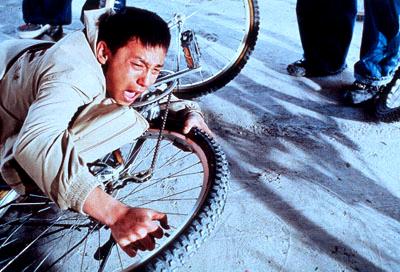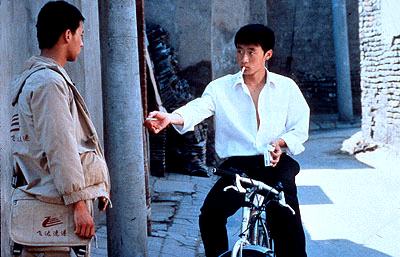

On the surface, Beijing Bicycle is about a man trying to reclaim what is rightly his, but this movie is also about the modernization of China and has lots to say on the struggle between the classes. Most Chinese movies deal with this kind of heavy social commentary deal with stories from its rich history, since it is easier to mask criticism of the government or current conditions behind similar stories of the past. Beijing Bicycle takes place in the present, so there is a virtual guarantee it will not be screened in China. The protagonist is Guei (Cui Lin), a young man who moves from the rural countryside to urban Beijing. His dress and mannerisms instantly set him apart from the more cultured, refined city folk. He gets a job for an express delivery company, delivering documents and packages by bicycle.
Unlike here in the United States, the bicycle is a hugely popular mode of transportation in China. To Guei, the bicycle represents his success as a worker. He is tenacious, and as the script repeatedly mentions, stubborn. His employer takes advantage of people like him. They take a large portion of the money Guei earns until they recover the cost of the bike, and then take a smaller portion. Guei meticulously tracks how close he is to owning his bike, only realize after a discovery that somebody stole his bike. The theft is devastating to Guei. He has little recourse, and does not know what he can do. He gets his boss to agree that if he finds the bike, he can have his job back. Amazingly, he tracks down the bicycle to Jian (Li Bin). Because he is from the country, everybody automatically assumes he is dumb. Nonetheless, he is smart enough to mark his bicycle and locate it.
Jian is a student in a family that is struggling with finances. To him, the bicycle represents acceptance by his peers, all of whom ride bicycles. Qin (Zhou Xun, April Rhapsody, Suzhou River), the girl he has a crush on, also has a bicycle. He likes Guei's bicycle because it is a sturdy, impressive mountain bike. Jian belongs to the educated class, the one with an almost certain future. His actions towards his family and Guei are impressively amoral; he would belong perfectly in Bully. The script and Li's performance casts a huge villainous shadow on him. His eternally blank face only makes him seem more of a monster.
Once Guei locates Jian, the movie only begins. Director Wang Xiaoshuai (Ruan's Song, Frozen) and co-writers Hsu Hsiao-ming (Homesick Eyes), Tang Danian (Beijing Bastards) and Peggy Chiao infuse some oddball humor and constant twists to keep the story flowing. He continues to add elements that further blur the line between what may be right and wrong. The dialogue is sparse, so when Wang punctuate the story with occasional violence, it is all the more effective. Wang shows that the assumptions on how 'poor' and 'educated' people act may be contrary to popular belief, in this case the opposite. Uneasy resolutions can also happen in odd ways, and may all be for naught.